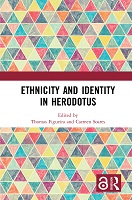Chapter 8 A goddess for the Greeks
Proposal review
Demeter as identity factor in Herodotus
Abstract
Herodotus is the epochal authority who inaugurated the European and Western consciousness of collective identity, whether in an awareness of other societies and of the nature of cultural variation itself or in the fashioning of Greek self-awareness – and necessarily that of later civilizations influenced by the ancient Greeks – which was perpetually in dialogue and tension with other ways of living in groups.
In this book, 14 contributors explore ethnicity – the very self-understanding of belonging to a separate body of human beings – and how it evolves and consolidates (or ethnogenesis). This inquiry is focussed through the lens of Herodotus as our earliest master of ethnography, in this instance not only as the stylized portrayal of other societies, but also as an exegesis on how ethnocultural differentiation may affect the lives, and even the very existence, of one’s own people.
Ethnicity and Identity in Herodotus is one facet of a project that intends to bring Portuguese and English-speaking scholars of antiquity into closer cooperation. It has united a cross-section of North American classicists with a distinguished cohort of Portuguese and Brazilian experts on Greek literature and history writing in English.
Keywords
Thutmose III,Young Men,Demeter Thesmophoros,Demeter Eleusinia,Book III,Demeter’s Sanctuary,Female Genital Cutting,Thriasian Plain,Athenaion Politeia,Lyric Poet Stesichorus,Greek Ethnic Identity,Ethnic Identifier,Naval Forces,Herodotean Narrative,Chthonic Goddess,Protective Goddess,Doric,Doric Dialect,Greek Renegades,Ionian Coast,Spartan King,Delphic Oracle,ViolatedDOI
10.4324/9781315209081ISBN
9781138631113, 9781032337210, 9781315209081Publisher
Taylor & FrancisPublisher website
https://taylorandfrancis.com/Publication date and place
2020Imprint
RoutledgeClassification
Ancient history


 Download
Download